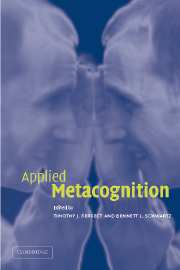Book contents
- Frontmatter
- Contents
- List of contributors
- Preface
- 1 Introduction: toward an applied metacognition
- Part 1 Metacognition in learning and education
- 2 The relation between metacognitive monitoring and control
- 3 Metacognition for text: findings and implications for education
- 4 Influence of practice tests on the accuracy of predicting memory performance for paired associates, sentences, and text material
- Part 2 Metacognition in everyday memory
- Part 3 Metacognition in different populations
- References
2 - The relation between metacognitive monitoring and control
Published online by Cambridge University Press: 22 September 2009
- Frontmatter
- Contents
- List of contributors
- Preface
- 1 Introduction: toward an applied metacognition
- Part 1 Metacognition in learning and education
- 2 The relation between metacognitive monitoring and control
- 3 Metacognition for text: findings and implications for education
- 4 Influence of practice tests on the accuracy of predicting memory performance for paired associates, sentences, and text material
- Part 2 Metacognition in everyday memory
- Part 3 Metacognition in different populations
- References
Summary
Introspective observation is what we have to rely on first and foremost and always.
William James (Principles of psychology, p. 185)William James' (1890) quote foreshadowed the current focus in the field of metacognition, the relation between monitoring and control. Monitoring means the ability to judge successfully one's own cognitive processes, and control means the ability to use those judgments to alter behavior. This chapter, like much of current metacognition research, concerns how we apply our judgments to alter our behavior, both during learning and during remembering.
About twenty years ago, Cavanaugh and Perlmutter (1982) wrote that the “present state of metamemory is not good …” (p. 22), and Flavell (1982) wrote that “none of us has yet come up with deeply insightful, detailed proposals about what metacognition is, how it operates, and how it develops” (p. 28). Some thought that metacognition was no longer a worthwhile topic (see Marshall and Morton, 1978; Wellman, 1983). However, starting with the seminal work of Thomas Nelson and his colleagues (e.g. Nelson, 1984; Nelson et al., 1982; Nelson et al., 1986), metacognition made a strong comeback. Whereas the research on metacognition prior to the 1980s was dominated by research directed at developmental processes (e.g. Flavell, 1979), research in the 1980s and 1990s was dominated by cognitive psychologists interested in already-developed processes in adults. It seems, though, that in order to maximize the knowledge gained from both lines of research, a marriage between the two is needed.
- Type
- Chapter
- Information
- Applied Metacognition , pp. 15 - 38Publisher: Cambridge University PressPrint publication year: 2002
References
- 38
- Cited by



